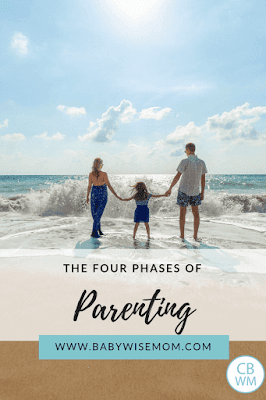Four Phases of Parenting (Childwise). How much control you should exert at each age of your child. When to lead, when to train, and when to be a friend.

Parenting would ideally follow a natural flow in life. You start with lots of control and slowly relinquish it. Problems arise when you try to give control too early or refuse to let go of it as appropriate.
There are four phases of parenting, the last one being the friendship phase. If you haven’t read the Parent vs. Friend: Childwise post, it is a good foundation before the information in this post. The four phases of parenting starts on page 55 in On Becoming Childwise.
Post Contents
The Four Phases of Parenting Explained
The success of each parenting phase is dependent upon the success of the phase preceding it. To have success and have true friendship in the end, remain mindful of which phase you are in and where you should be headed.
PHASE ONE: LEADERSHIP–2-6 years old
- Primary goal is to establish your leadership in your child’s life.
- Not oppressive leadership, but authoritative.
- This is a phase of boundaries. You allow freedoms as your child demonstrates responsible behavior.
- This is the bootcamp of child-rearing.
- You want to get control of your child so you can train him.
- This phase is the focus of the book On Becoming Childwise.
PHASE TWO: TRAINING–7-12 years old
- During training, your children are not yet in the real game of life.
- This is a series of practice sessions.
- You work with your child each day in different settings, going through drills and exercises (as Ezzo describes, using a sports analogy)
- You stop your child when necessary and make immediate corrections, explaining the reasons.
- Show your child what to do and how to do it.
- Your child will only listen to your training if you gained control in the discipline phase.
- This phase is the focus of the books The Smart Parent and On Becoming Preteen Wise.
PHASE THREE: COACHING–13-19 years old
- Your children are now in the real game of life for themselves.
- To continue the sports analogy, you send plays from the sidelines and huddle during time-outs
- You can no longer stop the game for extended periods to show how to play. This is the real deal.
- Your child calls the plays herself, adjusting as necessary, and moving forward on own.
- You are the coach. Your ability as a coach will determine how well our child runs the plays she has learned to this point.
- Your child will only listen to you as a coach if you did your job as a trainer.
- This phase is covered in the book On Becoming Teen Wise.
PHASE FOUR: FRIENDSHIP
- If you did your job in the previous three phases, this phase will come naturally.
- Your children will be your true friends, not just acquaintances.
- Remember, you must pay the price first. You can’t live on credit. You must put the work in to get friendship. Just as plants grow from seeds, not the leaves of the plant, friendship does not grow from friendship as a parent.
It might seem like a long process. 20 years before you reach true friendship? Yes, but think about how short that is compared to the lifespan of you and your child.
Read more about this in On Becoming Childwise (affiliate link)

